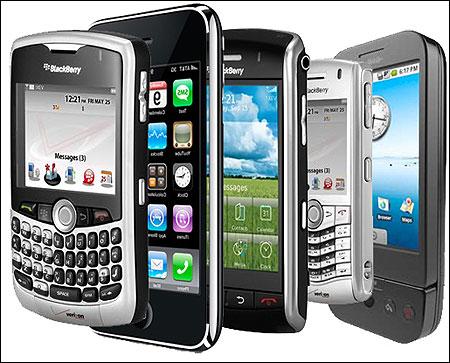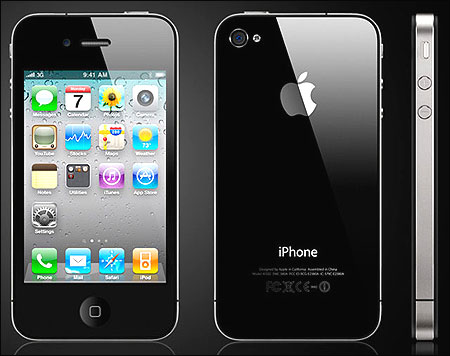
Android and iPhone, considered outsiders from a mobile industry perspective were able to revolutionise the industry and have created immense positive network externalities.
Who could have predicted the rise of newcomers Google or Apple in the mobile arena and fall of the traditional market leaders, a few years back? In fact, the top five smartphone vendors have changed dramatically over the last few years.
Changing market dynamics
The mobile industry's structure has witnessed unprecedented and tumultuous changes over the past two decades as the trendsetters and leaders have rapidly changed.
Up until a few years back, the mobile industry was controlled by the handset manufacturers or OEMs such as Nokia, Sony Ericsson, Samsung etc on one hand and the mobile operators on the other hand.
Click on NEXT for more...

Japan, long considered a top technology innovator and a pioneer in the mobile industry has suddenly seen its leadership position eroding.
Although Japan has quite a few firsts to its credit like the concept of App store and mobile money, the Japanese mobile industry of late has been struggling to keep pace with the Apple-Google effect.
The sheer size of the mobile phone market drives every other hardware or software vendor to believe that they have a high chance of being successful.
This has led to creation of many software phone platforms, by companies with deep mobile industry expertise and through consortium.
However, a few met with limited success and rest simply vanished. Google's Android, the open source software platform is perhaps the most successful thus far.
In general, why is the smartphone market important for OEMs and operators? While smartphones offer maximum margin to OEMs, it also helps in increased data revenue for the operators.
Content providers also enjoy direct benefits due to higher consumption of services and applications by smartphone users.
Click on NEXT for more...

Apple-Google double impact
The launch of Apple's iPhone and Google's Android has created an unprecedented double-impact on the mobile industry - iPhone is still the undisputed reference for a smartphone and has created an "aspirational value" among business users and consumers alike.
In contrast, Google's Android has ensured availability of hundred of phones at affordable prices.
Apple's user experience was a game changer, considering that many OEMs over the past 15 years failed in creating a compelling touch driven user experience. Android has played a key role in drastically reducing smartphone prices to less than Rs 5,000.
Android has significantly reduced engineering and R&D cost, thus lowering the entry barriers in the OEM space.
No wonder the Indian OEMs like Micromax, Lava etc provide tough competition to established players in the Indian market.
The semiconductor companies have also enabled this change as they seek to win market share and also be competitive in offering comprehensive solutions to OEMs.
Reduction in hardware and semiconductor costs have also helped in bringing down the prices of phones.
Click on NEXT for more...

Apple is credited for being vertically integrated - offering applications and content to its users through the App store and the recently launched iCloud service.
Google's App store too experienced tremendous success. This has resulted in a huge disruption in the market allowing users to personalize their phones from lakhs of Applications in the App store.
Earlier, users had to depend exclusively on their operator to download Apps/content and this was working nicely for the operators' walled-garden approach.
Large global operators on their part, continue to believe in providing quality apps to its subscribers, but with limited success.
Traditionally, a phone's life-cycle from concept to realisation has taken roughly 18 to 20 months. Over the past couple of years, the cycle has shrunk by more than half.
Newer models hit the market every few months. The drastic reduction in the phone creation cycle has naturally reduced the number of differentiating features among phones. Increasingly product differentiation among the various mobile phones is reducing by the day and the Mobile market is looking more like TV and other consumer electronics market.
Click on NEXT for more...

Challenges/ opportunities and more changes!
With most OEMs under severe margin pressure, such a hyper competitive environment is certain to witness more consolidation, allowing only the strong and truly innovative ones to survive.
Traditional hardware manufacturers can certainly cause disruption, but the challenging times are here to stay in the OEM space.
Operators, on the other hand may eventually have to remain contented being a data-pipe provider (aka landline broadband providers).
As the role of mobile devices becomes ever more important in people's lives, the platform powering the devices will play a critical role. Hence, more platforms like Android will emerge, however it is unlikely that Android will be displaced in the near future.
RIM (creator of Blackberry) is expected to push its platform aggressively. However, Microsoft's mobile platform may emerge as a dark horse, especially as Nokia has been able to move faster than before.
Click on NEXT for more...

Another challenge that has come to the fore is patents. Patent and royalties have always been part of the mobile Industry, but only recently has the patent war been so public.
In the past most patent disputes have been relatively low key affairs resolved issues behind closed doors.
In order to strengthen their position, over the last few quarters companies have made significant investment in acquiring available patents from Nortel and IBM, Google buying Motorola etc.
With the on-going cases around the Android platform, and Apple's recent successful patent lawsuit against HTC, it's clear that the patent war is not going to subside anytime soon.
It is proven beyond doubt that in such a market, Innovative companies with strong IP portfolio have a distinct edge.
Interacting with the mobile through gestures or tracking eye movement may re-define the market. Will Google's future technology - wearable computers bring about the ultimate disruption in the market.
Click on NEXT for more...

Apple has tried to maintain the stickiness quotient with its customers and there-by retaining its loyal customer base, however, will Apple be able surprise its users with innovative offerings every year?
Will Apple become a network service provider (MVNO), thereby creating an even tighter vertical integration and provide everything from handsets, network access, content to storage for its users?
The current social networking wave would continue, however, the next wave could well be mobile-money or mobile wallet. Will other countries be able to repeat Japan's success in mobile money?
Summing-up, the power equation in the mobile industry has shifted away from operators/ OEMs to platform providers. Android and iPhone, considered outsiders from a mobile industry perspective were able to revolutionise the industry and have created immense positive network externalities.
Due to the dynamic nature of this industry, anyone within or outside the mobile ecosystem now have an equal chance of changing the mobile Industry.
Amidst all the changes and challenges faced by the industry, for the average mobile phone user, the good times are here to stay!